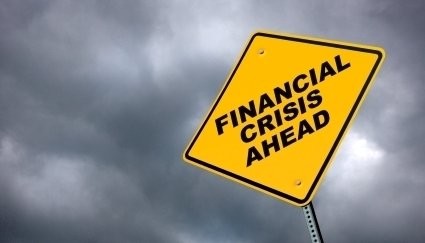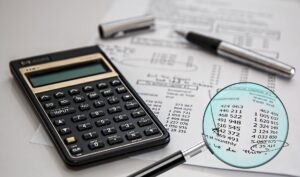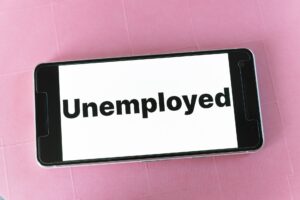When some things happen to us, we are completely caught off guard. We genuinely did not see them coming. But other things happen to us because the red flags were there, all over the place, and we kept ignoring them or simply just missing them. In financial matters when we fail to acknowledge the signs, even monthly bills become emergencies. This blog will cover six warning signs that could tell you early enough if you’re heading toward a financial disaster.
Living paycheck to paycheck
Living paycheck to paycheck and not doing anything about it is a clear indication that you are living beyond your means and thus heading into a financial disaster. Because if that paycheck ends up being cut off either because of a loss of job or loss of your ability to make an income, that will be catastrophic.
There are two recommendations in this case. First, you either need to look into making more money. Either by negotiating better pay at your job, or increasing your sources of income by other avenues of making additional income. Second, and the most immediate thing that you can do, is to look at your expenses and cut back on them. This you can do by using the 50-30-20 budgeting rule. This is the benchmark to help you investigate whether you are living within your means.
The rule asserts that 50% of your net income should cover your mandatory bills and expenses. Now, if 80% or 90 or a hundred percent of your entire income goes towards mandatory bills and expenses, that is a clear indication that you’re living above your means and you probably need to downgrade. Perhaps downgrading your house or downgrading your car downgrading.
Borrowing loans to pay other loans
Borrowing loans to pay other loans because you’re very deep into bad debt is a sign that you need to review your spending habit and take immediate action. Bad debt is the money that you’re taking out to supplement the fact that you’re living above your means. For instance, if towards the end of the month when your paycheck is done, you still need transport, you still need food, and other necessities, the debt you take out to cover these costs is consumer debt and examples of bad debt. Monthly expenses should not be a surprise.
If you constantly find yourself in this situation, I recommend coming up with a debt repayment strategy. You can either use the debt avalanche strategy, where you decide to pay off the debts that charge you the highest interest, or the snowball repayment method whereby you choose to pay your loans from the lowest amount, working your way through to the highest amount.
Thirdly, you can consider the debt repayment strategy that is referred to as debt consolidation. This is a very good repayment strategy for people who are overwhelmed with so many debts and their creditors want their money all at the same time. You will choose a particular entity, either a SACCO or even a personal friend that can give you a low-interest loan or a soft loan so that you can use that money to pay off all the small, stubborn debts. Then you remain with this one debt that you can repay consistently per month until you’ve cleared it.
You are unable to pay all your bills on time
The third warning sign that you could be heading towards financial trouble is that you will realize that time and time again you are unable to pay off your bills on time.
What can you do? You need to have a clear budget that indicates your financial priorities and goals. This will help you direct your money to the necessities first when you receive your salary. For recurring bills, you might also benefit by setting standing orders with your bank so that the recurring bills are paid automatically.
You don’t have an emergency
The fourth warning sign that you could be heading towards financial trouble is that you do not have an emergency fund or any financial portion to protect you in case of unforeseen emergencies, Without an emergency fund, you are literally one emergency away from the financial crisis. You’re already living paycheck to paycheck; you have zero savings and zero investments. What happens if you lose your job or have a huge hospital bill to take care of?
If you don’t have an emergency fund right now, at this very moment, you could be heading toward financial disaster. You want to prioritize building an emergency fund and starting it immediately.
Thinking about your finances gives you anxiety and fear of the future
When just thinking about your financial situation and thinking about money gives you anxiety, that could be a red flag. That could be a warning sign that you need to do something about it. Identify what you are anxious about. If it is your source of income then instead of just burying your head under the sand, start thinking of how you can make more. That’s better than just ignoring the situation and being anxious every time it pops up in your mind.
Are you anxious about the fact that you don’t have an emergency fund? Then figure out how you can build an emergency fund. It’s quite easy. Open a simple money market fund and pick a figure that you can start funding into consistently. The more money you make, the more money you put in there. It is a journey, a marathon, not a sprint. Worrying about not having an emergency fund and not doing anything about it is like doing the same thing over and over again and expecting a different result.
Your financial problems have started affecting your personal life
Whether you’re losing friends because you’re not paying back debt or your marriage is on the rocks because of financial situations or you’re now depressed and anxious all the time because of money, these are red flags —warning signs that you need to pay attention to your finances.
If you tick at least four out of six of these warning signs, the first thing you need to do is to start budgeting. Budgeting is telling your money where to go, not wondering where it went. I know I sound like a broken record because I keep saying this, but it’s the truth. You need to know where your money is going. You need to have a spending plan. What would I want my money to start doing for me now that I’ve identified there’s a problem? Where do I want my money to start going? Is it the emergency fund? You must intentionally and beforehand decide where you want your money to go. So that’s the first thing that you can do.
The second thing that you can do is to obviously cut back on unnecessary spending and think of avenues to make more money. Another thing that you can do is talk to a personal finance coach that would help you to analyze the situation and to come up with a financial plan or strategy. This is the area I specialize in. So if you would like to get one-on-one personal finance coaching, you can book a session with me today.






